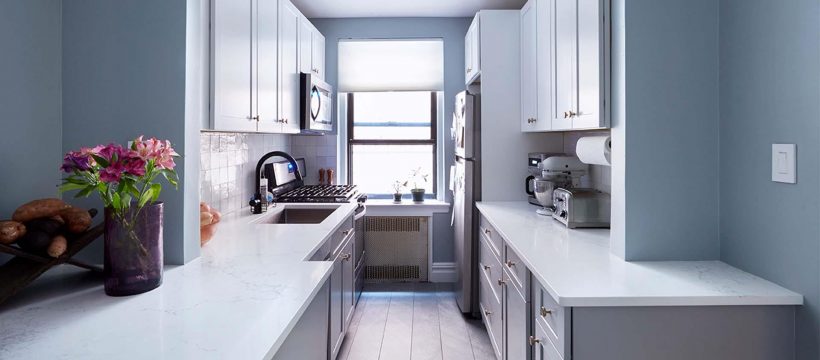WHILE we'd all no doubt love Kim Kardashian's home design budget — if not her actual home design — most of us have not worked with reality TV mogul money.
But one home design pro insists that you can renovate your kitchen without going broke — as long as you avoid common mistakes that cost too much and focus on small touches that make a huge difference.
"There are a lot of great ways to make your space feel luxurious without driving up costs," Carrie Schulz, Head of Design at Block Renovation, tells The U.S. Sun.
First, she tackles what not to do.
DON'T: REARRANGE EVERYTHING
"As a ground rule, if you’re looking to keep costs low, don’t move things around — keep things where they are," says Schulz.
"Taking down walls, moving faucets and ovens — all that will cause the cost of your renovation to skyrocket."
read more: home upgrades
I’m a home design expert – the 5 kitchen trends you need to avoid
I’m a home designer and my simple trick will neatly style shelves and mantels
DON'T: IGNORE REALITY
"We often see people underestimating the importance of functionality," Schulz says.
"Something can look great in a photo or mood board, but in the mess of real life can become burdensome."
That includes open shelving, which can "look great but can get easily busy if you store a lot of things in your kitchen and don’t counterbalance it with more cabinetry."
"Low lights might be great for a particular ambiance," she adds, "but without dimmers, under-lighting a space can make day-to-day life trickier."
Most read in Fabulous

Prince Harry reveals name of explosive £35m memoir as he tells story 'at last'

King Charles decides not to strip princes Andrew and Harry from major role

I hated my ‘saggy’ £14 Primark dress so fixed it with cheap hack, it looks great

I was told my work outfit was ‘inappropriate’ for showing ‘too much flesh’
DON'T: SPLURGE ON ANYTHING TOO UNIQUE
If you're concerned about return on investment when selling your house one day, another big "don't" is splashing out on "idiosyncratic investments" — touches that won't have wide appeal with other people.
"That can range from super-high-end kitchen appliances to smaller details like wallpaper," Schulz says.
Another example is picking unique or high-end backsplash materials like custom marble.
"They might appeal to you, but they might not be everyone’s cup of tea and not pay off in the long run."
DON'T: PRETEND YOU'RE A PRO CHEF
Shulz says it's common for people to buy ultra-high-end appliances that they don't really need.
"There are so many options out there that perform wonderfully at a lower price point," she insists.
"Unless you’re specifically going for a chef-grade kitchen, you’ll be able to do everything you need day-to-day with lower-priced tools.
DO: MAKE THE MOST OF SMALLER DETAILS
"You should strive to keep iconic details when you can," says Shulz.
"Little details like crown molding can add a lot of charm to a space if you incorporate it into your remodel the right way.
"Color selection for your cabinets can also go a long way in achieving a high-end look, and it rarely costs extra.
"If you want to go more bold, we've been seeing subtle green tones popping up in kitchen cabinetry, which we think adds a really charming, chic feel to these spaces, while colors like royal blue can add a bit of old-school luxury to the space."
DO: FIND DUPES
"In terms of small tips and tricks, the biggest thing we’d recommend is material substitutions," says the pro.
For example, Caesarstone countertops look like marble, but they can be 20 percent cheaper and are also less expensive to maintain.
DO: EMBRACE "LESS IS MORE" MENTALITY
"Overall, opting for a more minimalist look can keep things feeling clean and luxe without breaking the bank, and let small details (which tend to be more affordable) shine through," Shulz explains.
"That way, the nice magnetic knife strip you got for $50 can serve as a more defining moment in your space. And lovely lighting fixtures and doorknobs can shine through."
DO: THINK OF THE "KITCHEN TRIANGLE"
Schulz stresses the importance of considering how things will function in everyday use.
The "kitchen triangle" — the relationship between the cook zone, washing area, and where you keep all your ingredients — should be a fixture of your planning.
"In the case of an open-concept kitchen, remember to work out how prep areas and party areas might work together," she explains.
Source: Read Full Article






